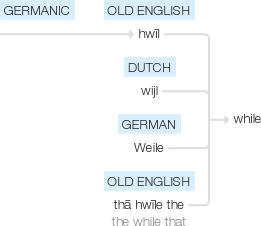While
Old English hwīl ‘period of time’, of Germanic origin; related to Dutch wijl, German Weile ; the conjunction is an abbreviation of Old English thā hwīle the ‘the while that’.
wiktionary
Middle English while, from Old English hwīl, from Proto-West Germanic *hwīlu, from Proto-Germanic *hwīlō (compare Dutch wijl, Low German Wiel, German Weile, Danish hvile(“rest”), Norwegian Bokmål hvile(“rest”)), from Proto-Indo-European *kʷyeh₁-(“to rest”). Cognate with Albanian sillë(“breakfast”), Latin tranquillus, Sanskrit चिर(cirá), Persian شاد (šād).
etymonline
while (n.)
Old English hwile, accusative of hwil "a space of time," from Proto-Germanic *hwilo (source also of Old Saxon hwil, Old Frisian hwile, Old High German hwila, German Weile, Gothic hveila "space of time, while"), originally "rest" (compare Old Norse hvila "bed," hvild "rest"), from PIE *kwi-lo-, suffixed form of root *kweie- "to rest, be quiet." Notion of "period of rest" became in Germanic "period of time."
Now largely superseded by time except in formulaic constructions (such as all the while). Middle English sense of "short space of time spent in doing something" now only preserved in worthwhile and phrases such as worth (one's) while. As a conjunction, "during or in the time that; as long as" (late Old English), it represents Old English þa hwile þe, literally "the while that." Form whiles is recorded from early 13c.; whilst is from late 14c., with unetymological -st as in amongst, amidst. Service while-you-wait is attested from 1911.
while (v.)
"to cause (time) to pass (without dullness)," 1630s, earlier "to occupy or engage (someone or something) for a period of time" (c. 1600), new formation from while (n.), not considered to be from Middle English hwulen "to have leisure," which is from a Germanic verb form of while (n.) (compare German weilen "to stay, linger"). An association with phrases such as Shakespearean beguile the day, Latin diem decipere, French tromper le temps "has led to the substitution of WILE v by some modern writers" [OED] (see wile (v.)).
